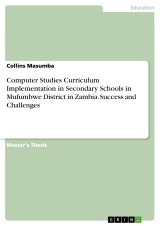Details

Computer Studies Curriculum Implementation in Secondary Schools in Mufumbwe District in Zambia. Success and Challenges
1. Auflage
|
39,99 € |
|
| Verlag: | Grin Verlag |
| Format: | |
| Veröffentl.: | 12.11.2019 |
| ISBN/EAN: | 9783346057365 |
| Sprache: | englisch |
| Anzahl Seiten: | 157 |
Dieses eBook erhalten Sie ohne Kopierschutz.
Beschreibungen
Master's Thesis from the year 2019 in the subject Didactics - Computer Science, grade: B, University of Zambia, language: English, abstract: The purpose of this study was to investigate the Computer Studies Curriculum implementation in rural secondary schools of Zambia’s Mufumbwe district. This study was guided by the following questions: What facilities and equipment are available for the implementation of the Computer Studies Curriculum in selected secondary schools of Mufumbwe district? Are there enough qualified teachers to enhance the effective implementation of the Computer Studies Curriculum? How appropriate are the teaching methodologies in the implementation of the Computer Studies Curriculum? What are the head teachers’, teachers’, learners’ and parents’ views on the teaching of Computer Studies?
Globalisation and technological development in the world have accelerated and created a new global economy fuelled by information and driven by innovations. One way in which information spreads is by the use of computers. In the 2013 revised curriculum, the Ministry of General Education in Zambia introduced Computer Studies into the education system. The few studies in this area were done in urban areas. The rural setting has been ignored as regards to implementation of Computer Studies Curriculum. Mufumbwe district being a rural setting is a special case especially in a Zambian context considering development trends in Zambia. Specifically, the study sought to establish the availability of facilities and equipment for the implementation of Computer Studies, find out the availability of qualified Computer Studies teachers, examine the appropriateness of teaching methods and establish the views of Head Teachers, teachers, learners and parents on the implementation of Computer Studies in Secondary Schools in Mufumbwe district.
Lack of computer skills among learners in Zambia may hinder technological advancement and fail to achieve the national ICT policy goal of 2007 which introduced CS as an enabler in a diversified and export-oriented economy, capable to improve livelihoods and protect the vulnerable through service delivery and provide an efficient and effective public sector. Further, Zambia may fail to achieve the vision 2030 whose vision is to have a prosperous middle-income nation through having a technologically proficient, fully able to adapt, innovate and invest using its human and natural resources. It was therefore important that this study was conducted in order to investigate how CSC was being implemented in rural secondary schools in Mufumbwe district.
Globalisation and technological development in the world have accelerated and created a new global economy fuelled by information and driven by innovations. One way in which information spreads is by the use of computers. In the 2013 revised curriculum, the Ministry of General Education in Zambia introduced Computer Studies into the education system. The few studies in this area were done in urban areas. The rural setting has been ignored as regards to implementation of Computer Studies Curriculum. Mufumbwe district being a rural setting is a special case especially in a Zambian context considering development trends in Zambia. Specifically, the study sought to establish the availability of facilities and equipment for the implementation of Computer Studies, find out the availability of qualified Computer Studies teachers, examine the appropriateness of teaching methods and establish the views of Head Teachers, teachers, learners and parents on the implementation of Computer Studies in Secondary Schools in Mufumbwe district.
Lack of computer skills among learners in Zambia may hinder technological advancement and fail to achieve the national ICT policy goal of 2007 which introduced CS as an enabler in a diversified and export-oriented economy, capable to improve livelihoods and protect the vulnerable through service delivery and provide an efficient and effective public sector. Further, Zambia may fail to achieve the vision 2030 whose vision is to have a prosperous middle-income nation through having a technologically proficient, fully able to adapt, innovate and invest using its human and natural resources. It was therefore important that this study was conducted in order to investigate how CSC was being implemented in rural secondary schools in Mufumbwe district.
Diese Produkte könnten Sie auch interessieren:

Berufsorientierung in der Schule - ein Vergleich der Lehrplaninhalte von Wien und Berlin

von: Isabella Löffler

23,00 €















